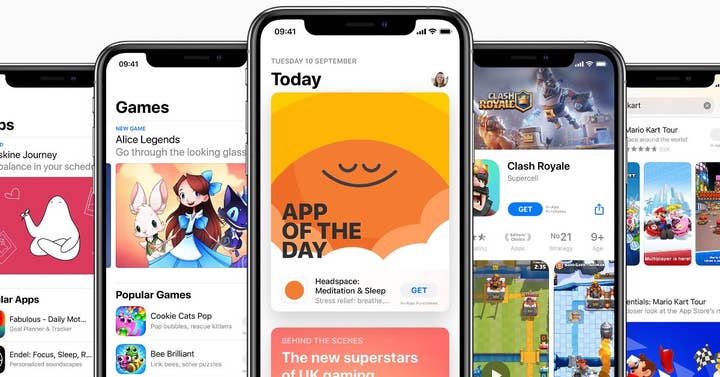Does the Epic vs Apple judgement open iOS to more legal attacks?
Legal experts discuss the ramifications of the recent court decision in the ongoing dispute
For all the buzz around Epic Games' legal crusade against Apple the judgment was somewhat anticlimactic -- although perhaps that doesn't come across from the way many outlets reported it.
Despite the number of headlines over the weekend that claimed 'Epic wins big in Apple trial' (and variations along those lines), Judge Yvonne Gonzales Rogers only sided with the Fortnite firm in one of the ten counts it levelled at the iOS maker.
The court did not classify Apple as a monopoly, and while it suggested it could feasibly become one in the short-term, it did not find that it has grown to this size through unfair or illegal means. The court also did not demand iOS be open to third-party app marketplaces, nor did it order the restoration of Fortnite to the App Store.
But it did concede that Apple's restrictions against directing users to external payment systems are anticompetitive and must change.
That victory is not to be underestimated of course, given how rarely Apple has changed the fundamentals of how it operates iOS since the platform first launched in 2008. But it's undermined to an extent by the fact that even the judge's nationwide injunction ordering Apple to allow developers to link to external payment options by December 9, 2021 doesn't provide a guaranteed escape from the highly criticised 30% commission fee it takes on all transactions. (However, it's logistically more complex for Apple to monitor and obtain its cut for transactions not handled directly through its own platform).

The anti-steering change comes at a cost, as Epic Games' admission that it breached its developer agreement with Apple using the hotfix to introduce direct payments into Fortnite means the judge ordered the company to pay Apple 30% of any money collected through the iOS version since August 2020, a sum which had reached $12 million by October.
Gamma Law managing partner David B. Hoppe observes that Epic Games' solitary win in this case may perhaps have been an inevitability given the increasing scrutiny on the major app platforms.
"In the month or so before the decision, we had multiple developments in the United States and other countries that suddenly make it seem that Apple's and Google's anti-steering policies won't survive for much longer anyway," he says. "So the decision in this case requiring Apple to allow links to alternative payment methods in apps doesn't have the impact that it would have when Epic v. Apple was filed. In that respect, Epic may not get the credit it deserves for taking on this issue over a year ago."
Richard Hoeg, managing partner of The Hoeg Law Firm, adds that those celebrating the opening of a route around the 30% 'Apple tax' might want to rein in that enthusiasm for now. As he's explored thoroughly with recent episodes of his Virtual Legality series, the iOS developer licensing agreement stipulates that even transactions made via external payment providers may be subject to some form of commission from Apple. Even transactions from users gained via the iOS platform, e.g. those that register an account through an iPhone app, can potentially be charged. And Judge Gonzales Rogers didn't change that at all.
"Some might say that the judge offered a potential roadmap for the next case against Apple"
David Kesselman, Kesselman Brantly Stockinger
"The Court's decision to enjoin Apple from its prohibition on external links definitively does not prevent Apple from requiring Apple IAP in-app, nor does it suggest that simply driving people off-app will allow developers to skirt Apple's commission," Hoeg explains. "The Court expressly found that Apple is entitled to some fee for the services it provides as part of its ecosystem, and further that its distribution and IAP model is not anticompetitive.
"In practical terms, that means that Apple's 30% is 'earned' from access -- though reasonable minds can differ on the rate itself -- and that Apple's license, which already does this to some extent, would simply need to say, 'Please report and remit our commission once received on funds generated from links in-app' for there to be a contractual requirement for developers to pay.
"I fear that some developers will read the headlines and believe they can code up a link to not pay Apple a dime, and that's not what the Court determined at all."
It's also worth remembering that the court's judgment, as it stands, is not set in stone. Epic has (inevitably) filed a notice to appeal against the decision, and Apple also has the right to push back against the one count on which it lost (although at the time of writing, it does not appear to have done so). Whether this means Epic could achieve a greater victory on appeal, gaining ground with the counts that so far have failed, remains to be seen -- although our legal experts are not optimistic.

"With Apple and Google both facing regulatory headwinds, I actually would rate Epic's chances as a bit higher than at the trial court level -- but even [so], fewer than 10% of appeals end in a full reversal [according to the Ninth Circuit's 2020 annual report]," says Hoeg.
"In order to win, I think Epic needs to focus down on what it has the best chance of succeeding on, perhaps dropping the 'IAP as separate product' line of attack, and potentially the monopoly argument, in favor of going after flat restraint of trade. Reasonable minds will differ on strategy there, however, so it would not surprise me if Epic went full kitchen sink on its appeal."

Hoppe agrees that it's "possible" Epic could convince the appellate court that opening iOS to competing app stores would be an additional remedy to Apple's potentially anticompetitive behaviour, but stresses that this seems "unlikely."
"It would be a pretty significant intervention by a court into the operation of a private business, particularly without a finding that Apple is a monopolist," he explains. "And we also have this situation where a bill was just introduced into the US Congress that would do just that -- require large platforms to allow competing app stores. Under those circumstances, I think it's very unlikely that a court would want to step in and mandate something that Congress is going to vote on, or perhaps that Congress has just voted down."
For a case that many speculated could change the face of the industry as we know it (and particularly for any developers who believed in the Fortnite firm's rhetoric about the fight for app fairness on behalf of all small developers), the judgment may not be what they hoped for -- especially for Epic. But there are still potential opportunities for those who wish to tear down the walls of Apple's iOS garden. Yes, Epic Games has failed (so far) to bring about significant change... but it may have paved the way for other, stronger cases.
David Kesselman, partner at California law firm Kesselman Brantly Stockinger, notes that if you read between the lines of Judge Gonzales Rogers' comments, the ruling is "fascinating."
"The Court was clearly signaling that it thinks the 30% rate itself is vulnerable"
Richard Hoeg, The Hoeg Law Firm
"While she held that Epic ultimately failed to meet its burden of proving that Apple engaged in violations of 'traditional' antitrust law (federal Sherman Act Sections 1 and 2 and California's Cartwright Act), she seemingly went out of her way to suggest that such a finding was not impossible; only that Epic had failed to meet its burden here," he says.
"Indeed, the judge made clear that Apple has market power in the mobile gaming market (a market definition that Epic did not proffer but that the judge believed best captured the market at issue in the case). And she further made clear that Apple has imposed restrictions that cause anticompetitive effects in the market.
"In fact, she made a point of repeatedly suggesting that Apple's 30% commission rate is artificial and not a result of market forces. Nevertheless, the judge found that Apple proffered valid and sufficient justifications regarding security and intellectual property. And so she could not make a finding that Apple's restrictions (as challenged by Epic) resulted in traditional antitrust violations."
Hoeg agrees, adding: "The Court was clearly signaling that it thinks the 30% rate itself is vulnerable, but given that there are no pending cases on that item, it's unclear where that line of attack will go.
"Outside the legal sphere, I do think Epic could have some success with continuing lobbying efforts of the 'Look how broken our laws are. Something must be done' variety. There's clearly a lot of animosity towards Big Tech at virtually all levels of government."
And it's worth remembering Epic has plenty of other opportunities to continue its fight. Even if it loses its appeal, there are still cases against Apple in the EU and Australia, plus similar lawsuits filed against Google in the US, UK and Australia. Hoeg observes that the experience of this trial may have indicated a potentially winning strategy for when it takes on Apple's main rival.

"I think this opens up a number of good attack avenues for Epic against Google, particularly in respect of their main theory that the OS itself is a monopolized foremarket: giving rise to anticompetitive behavior in the distribution and IAP aftermarkets," he explains.
"That is because one of the main reasons that Epic failed on its theory in the Apple case was that Apple doesn't sell or license its iOS to outside parties; there was no market. In the Google case, I think Epic will have more success framing the OS as a product, and leaning in to some of the precedents from the MS/Windows line of cases in the '90s.
"Still, Epic will continue to have a problem establishing Google's actions as unreasonably justified, and clearly the court system on the whole does not love the way it initially brought the case."
That said, this initial judgment -- especially the judge's decision not to label Apple as a monopoly (as it stands today, at least) -- will cast a shadow over future verdicts, although Hoppe believes there are still enough differences in other markets to give Epic a fighting chance.
"I think it's undeniable that a ruling by a US federal court will have a persuasive effect on those cases proceeding outside the US, but antitrust law varies significantly in different countries, so those judges will have many other factors to consider," he says.
"I don't see any reason that Epic would adjust its strategy for the overseas cases. As a general matter, antitrust law outside the US is more favorable to plaintiffs, like Epic. The fact that Epic won a fairly significant concession from a US federal court, and that the US judge said that Apple may be an 'incipient monopolist,' are probably positive factors for these other cases. "

Kesselman warns that Judge Gonzales Rogers' ruling has "serious implications on multiple levels," adding: "First, with respect to traditional antitrust law, I think some might say that the judge offered a potential roadmap for the next case against Apple. She noted Apple's market power (at least in the mobile gaming market), and identified several anticompetitive effects, including her view that the 30% commission Apple charges is arbitrary and untethered to market forces.
"Armed with that roadmap, others may try to succeed where Epic did not (partly because its focus was on a slightly different market definition and its primary goal was seemingly to require Apple to allow a competitive payment option within Apple's own walled garden).
"Second, the Judge's use of California's Unfair Competition Law may also provide a roadmap to other potential plaintiffs (and not just limited to those who may want to sue Apple). The California Supreme Court had long held that it might be possible to maintain an unfair competition claim even if the challenged conduct did not specifically meet all of the requirements of a traditional antitrust claim.
"But, to my knowledge, this is the first time that a court actually applied the law in this manner and found such a violation. It could signal a renewed focus on California's Unfair Competition Law - particularly because so many large technology companies are based in California."
While there remains potential for change, Judge Gonzales Rogers' warning last year that the outcome could have "serious ramifications" for the likes of Nintendo, Sony and Microsoft seems to be less of an issue for now. Much of Epic's arguments -- from the inability to launch a competing games marketplace, to complaints around the 30% commission -- apply equally to the console makers, but this initial ruling currently protects that business model.
"I think the Xbox, PlayStation, and Switch folks should be breathing a sigh of relief," Hoeg concludes. "I know that Microsoft itself is relatively okay blowing open the walled gardens, but as the Court noted there was no real legal daylight between Epic's theory that OS control, even for wholly owned brands, was fundamentally monopolistic, and the way Sony, Nintendo, and Microsoft do business with their own boxes.
"For anyone that likes to have that curation, it was a good day, and it's also important to note that the Court formally established the walled garden itself as a valid business model which is specifically competitive in how it differentiates itself from a more open system."

